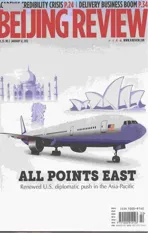Explorers of The Deep
2012-10-14ChinatakespartininternationalseabedresourceresearchByZhangHaiwenZhangDan
China takes part in international seabed resource research By Zhang Haiwen & Zhang Dan
Explorers of The Deep
China takes part in international seabed resource research By Zhang Haiwen & Zhang Dan
The International Seabed Authority(ISA) signed a contract on the exploration of polymetallic sulphides submitted with the China Ocean Mineral Resources Research and Development Association (COMRA) in November 2011.Surprisingly, the event has been hyped as an addition to the “China threat” by critics with ulterior motives. They say China is extending its tentacles into the Indian Ocean, challenging the oceanic interests of India. These accusations are both ignorant and absurd.
Participation
The newly contracted exploration area is located in the mid-oceanic ridge in the southwest Indian Ocean. It lies in the international seabed area outside the national jurisdiction of coastal countries. The contract area covers about 10,000 square km.
According to the contract, in the next 15 years, the COMRA will be obligated to conduct environmental monitoring and surveying in the area and coach researchers from developing countries. And within 10 years after the signing of the contract, the COMRA should return 75 percent of the exploration area to the ISA and retain the remaining portion as an area where it is entitled to priority mining rights.
The contract made China the fi rst country that has signed two exploration contracts with the ISA. The COMRA began participating in resource exploration activities in international seabed areas more than 20 years ago.In March 1991, the UN approved a 15,000-square-km international seabed area in the northeast Paci fi c for the COMRA to conduct resource exploration.
In accordance with the UN Convention on the Law of the Sea (UNCLOS) adopted in 1982, the COMRA relinquished half of this area in March 1999. In 2001, it signed a polymetallic nodule exploration contract with the ISA, gaining priority mining rights in the remaining half of the exploration area.
Regulations
There are specific regulations on resource exploration activities in international seabed areas in the UNCLOS. The UNCLOS de fi nes international seabed areas as the seabed, ocean fl oor and subsoil beyond the limits of national jurisdiction. They encompass the seabed and subsoil that underlie the high seas, but are outside the continental shelf areas claimed by coastal states.
The UNCLOS has not only authorized coastal states the exclusive sovereign rights to explore seabed resources within the limits of their national jurisdiction but also granted all countries equal rights to explore seabed resources in international seabed areas.

XINHUA

ZHOU WENJIE
(Left) NEW DEPTHS:China’s manned submersibleJiaolongemerges after diving more than 5,000 meters under sea level in the northeast Paci fi c on July 28, 2011
PRECIOUS RESOURCES:Polymetallic nodule samples collected by a Chinese ocean expedition vessel

MISSION ACCOMPLISHED: Chinese researchers pour seawater from Atlantic, Paci fi c and Indian oceans to mark the completion of their yearlong expedition on December 11, 2011 in Qingdao, Shandong Province
International seabed areas are endowed with abundant mineral resources. In the 1970s, during the drafting of the UNCLOS,the international community showed great optimism in polymetallic nodule exploration in international seabed areas. Most of the first contracts the ISA signed concerned polymetallic nodule exploration and development, including contracts with Russia, China,Germany, France, Japan, South Korea and India.
The commercial development of polymetallic nodules, however, has been delayed.Instead, polymetallic sulphides have drawn more attention from the international community. Polymetallic sulphides, mainly distributed in special geographic environments in mid-oceanic ridge areas, are rich in metals such as copper, lead, zinc, gold and silver. Polymetallic sulphide exploration is therefore potentially lucrative. Research on these minerals also helps us learn more about oceans and better protect the marine environment.
Apart from signing a polymetallic sulphide exploration contract with the COMRA,the ISA has also approved an application by a Russian enterprise for the exploration of polymetallic sulphides.
Obligations
As one of the signatory parties to the UNCLOS, China enjoys the right to explore international seabed resources. The COMRA is the organization through which China participates in international seabed exploration.
Since its establishment in 1990, the COMRA has taken an active part in exploring resources in international seabed areas.In a contract signing ceremony in November 2011, ISA Secretary General Nii Allotey Odunton said with unremitting efforts over the years, the COMRA has made great contributions to the exploration of international seabed area resources and the protection of biological diversity in international oceans.
All contractors involved in the exploration and development of polymetallic sulphides and polymetallic nodules have corresponding obligations. First, they should invest substantially in surveying resources in their contract areas and file reports of the exploration activities to the ISA annually. Second, they should waive certain exploration areas and put them under the ISA’s management. The ISA will explore and develop these areas for the bene fi t of all humanity. After ful fi lling their obligations, contractors can obtain the exclusive right of resource exploration in the remaining parts of their contract areas and reap commercial bene fi ts from them.
In March 1999, the COMRA fulfilled its obligations in its first contract with the ISA by relinquishing half of its contract area to the ISA.In accordance with its second contract signed in November 2011, it will transfer 75 percent of its contract area to the ISA in the next 15 years.
All the COMRA’s resource exploration and surveying activities in international seabed areas are based on its contracts with the ISA and comply with the rules of the UNCLOS. As it engages in these activities,the COMRA has not only obtained rights of international seabed resource exploration for China, but also contributed to mankind’s efforts to develop marine resources.
Zhang Haiwen is deputy head of the China Institute for Marine Affairs; Zhang Dan is an assistant research fellow with the institute
